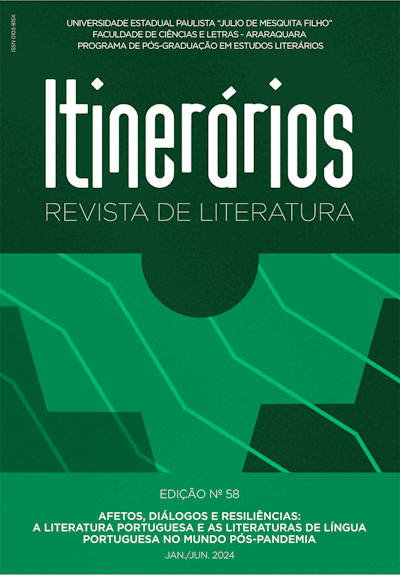Apropriação política da memória em “Melhor a ementa que o cianeto”, de Ana Margarida de Carvalho
DOI:
https://doi.org/10.58943/irl.v1i58.18740Palavras-chave:
Ana Margarida de Carvalho, Deslocamento, Memória, Identidade, PolíticaResumo
A manutenção da memória frente à política de apagamento de traumas coletivos atua como resistência e prevenção da repetição cíclica da história. Por outro prisma, a pretensa manutenção da memória também pode ser uma via de legitimação de políticas que destituem o estatuto de sujeitos da memória para torná-los objeto de uma memória narrada por outros. O personagem do conto “Melhor a ementa que o cianeto”, de Ana Margarida de Carvalho, torna-se alvo dessas políticas. Publicado em Uma terra prometida, 2016, o conto possui como protagonista um residente do centro para idosos refugiados. Neste centro, ele é constantemente interpelado sobre suas memórias, de forma a preencher lacunas nas narrativas que as organizações europeias detêm sobre seu passado. Narrado em terceira pessoa, o conto sintetiza a tentativa institucional de gerenciamento dessas memórias como mecanismo reparador. Sendo assim, buscamos estabelecer a partir do personagem-refugiado uma compreensão do uso político da memória que não está ancorado nos estratagemas do esquecer, mas nos do lembrar. Para viabilizar essas considerações, contaremos com as discussões de Jeanne Marie Gagnebin (2009) e Aleida Assmann (2011) acerca da indissociação entre os movimentos do lembrar e do esquecer e de Judith Butler (2015) e Andreas Huyssen (2014) sobre o discurso da memória e a ética do esquecimento.
Downloads
Publicado
Edição
Seção
Licença
Os manuscritos aceitos e publicados são de propriedade da revista Itinerários. É vedada a submissão integral ou parcial do manuscrito a qualquer outro periódico. A responsabilidade do conteúdo dos artigos é exclusiva dos autores. É vedada a tradução para outro idioma sem a autorização escrita do Editor ouvida a Comissão Editorial.

